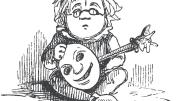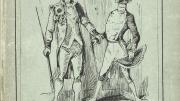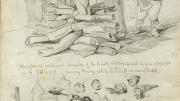In his time (1811-1863), Thackeray ranked second only to Charles Dickens in the English literary pantheon. Now he is mostly ignored except as the author of the novel Vanity Fair, in which he skewered large segments of British society with cheerful humor and hatched an agreeably roguish heroine, Becky Sharp. In an attempt to reintroduce readers to a once-celebrated writer, the Houghton Library mounted an exhibition, on the bicentennial of Thackeray’s birth, displaying material from its rich collection of his books, manuscripts, correspondence, and drawings, together with items lent by other collectors. It was organized chiefly by Heather Cole, assistant curator of modern books and manuscripts, and it remains online (https://hcl.harvard.edu/libraries/houghton/exhibits/thackeray). The exhibition provides insight into Thackeray the devoted son, affectionate father, and loyal friend, not to mention the gourmandizer, of whom it was said that his main activity apart from writing was “guttling and gorging.” (He was incurably addicted to spicy peppers.)
Shown here are a self-portrait from an 1848 edition of Vanity Fair, and (left) the 53 installments of his series “The Snobs of England,” in Punch, in a collected edition of 1848. He lampooned all sorts, including “literary snobs,” “dining-out snobs,” and “party-giving snobs.” Below, to entertain the children of a friend, Thackeray filled an album with the humorous “Adventures of a French Count.” The count eventually escapes the executioner.
From Harvard Yard comes more Thackeray: The 1876 Gate, just by the freshman dorm Holworthy Hall, bears a snippet of his verse. Look up and read: “In memory of dear old times.” The gate was given by the class of 1876 on their twenty-fifth reunion in 1901. The quotation is from Thackeray’s “The Ballad of the Bouillabaisse,” a poem about food, drink, and fellowship, in which the poet returns to a Parisian inn to sample the famous fish stew that sustained him and his fellows in their youth—along with a few glasses of good burgundy:
I drink it as the Fates ordain it.
Come, fill it and have done with
rhymes;
Fill up the lonely glass and drain it
In memory of dear old times.











